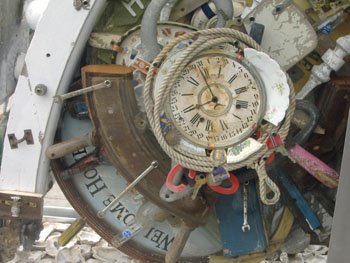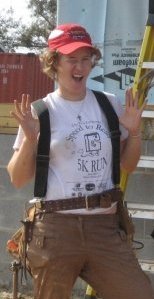Two years after Hurricane Katrina, life on the Gulf Coast has become a strange mix of the outwardly normal interspliced with the inwardly fragile. Storms forming in the Gulf loom over every casual conversation about the weather; a mundane review of a staff hurricane preparedness plan causes faces to cloud and shoulders to slump as coworkers relive the pain of Katrina’s chaotic aftermath. Though they faithfully show up for work, poor sleep and depression plague everyone from the cashier at the food mart down the street to Miss Gina, the woman holding together the local soup kitchen with her two hands. School-aged children cower in closets when afternoon thunder rolls on the Gulf; Miss Clara, an elderly client, blows out another year’s candles with a fervent wish not to spend her next birthday in a trailer seeping formaldehyde. There’s a sense that we are all teetering on the edge of a delicate balance between the routine and the heart-stopping.
Thankfully, physical progress continues to scramble determinedly along, thanks largely to volunteer groups like the ones that have come to serve at the organization where I work. One by one, damaged houses come back to life, as signs of recovery crop up like the morning glories in the vacant lots now dotting the city. Traffic lights have been restored on the main drag, and the bridge at the west end of Highway 90 reopened in June. Thanks to the labors of our volunteers, Miss Clara will be back in her house by Christmas instead of sometime next year. But the deepest damage wreaked by the storm—perhaps less immediately evident, but no less insidious—is that inflicted upon the spirits of those who bore the wrath of Katrina and who fight, every day, the battle of reconstructing entire lives from next to nothing. As much effort and energy as it takes to re-shingle tattered roofs, install new cabinets, repair rotten siding and replace buckled flooring, these tasks are all readily tackled with the abundance of volunteer sweat and enthusiasm which we are so blessed to have. A far more elusive commission for our community remains that of our organization's post-Katrina slogan: Rebuilding Lives, Rebuilding Hope.
As the two-year anniversary approaches, we are all called to reflect on how far we’ve come and how far we have yet to go, and what role each of us—you and I—might play in the continued effort to accomplish our mission. As welcome as physical labor and material and financial donations continue to be, taking the time to establish an exchange with local school kids*, or to write a letter of solidarity to the local paper (www.sunherald.com); calling your senators, then representatives, to ask them to push hurricane recovery funding through Congress; saying a simple prayer for the physical and spiritual recovery of the Gulf Coast—these are gifts just as valuable as a nail pounded in a two-by-four. Let the Coast know you have not forgotten them—or us, I should say, because in a way I have become a part of the community here, and I feel called to remain in Mississippi past the end of my volunteer term and to keep working for a just recovery. So I, along with the rest of the Coast, ask for your ongoing prayers and support, as we continue to Rebuild Lives and Rebuild Hope.
*http://www.greatschools.net/cgi-bin/ms/district_profile/9/ ; http://www.lbsd.k12.ms.us/ ; http://www.gulfportschools.org/index2.html ; www.biloxischools.net ; http://www.harrison.k12.ms.us/Default.aspx?tabid=135 ; http://www.ossd.k12.ms.us/
The Day Time Stood Still

Close-up of the town Katrina Memorial.
Monday, August 27, 2007
Subscribe to:
Comments (Atom)



